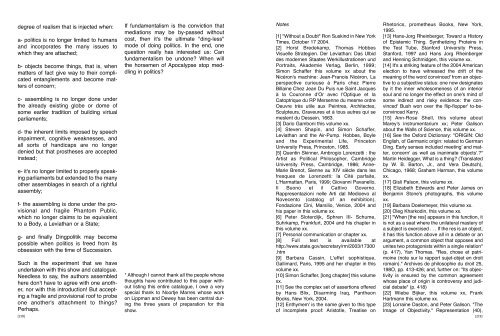PAVILION
PAVILION
PAVILION
- No tags were found...
You also want an ePaper? Increase the reach of your titles
YUMPU automatically turns print PDFs into web optimized ePapers that Google loves.
degree of realism that is injected when:<br />
a- politics is no longer limited to humans<br />
and incorporates the many issues to<br />
which they are attached;<br />
b- objects become things, that is, when<br />
matters of fact give way to their complicated<br />
entanglements and become matters<br />
of concern;<br />
c- assembling is no longer done under<br />
the already existing globe or dome of<br />
some earlier tradition of building virtual<br />
parliaments;<br />
d- the inherent limits imposed by speech<br />
impairment, cognitive weaknesses, and<br />
all sorts of handicaps are no longer<br />
denied but that prostheses are accepted<br />
instead;<br />
e- it's no longer limited to properly speaking<br />
parliaments but extended to the many<br />
other assemblages in search of a rightful<br />
assembly;<br />
f- the assembling is done under the provisional<br />
and fragile Phantom Public,<br />
which no longer claims to be equivalent<br />
to a Body, a Leviathan or a State;<br />
g- and finally Dingpolitik may become<br />
possible when politics is freed from its<br />
obsession with the time of Succession.<br />
Such is the experiment that we have<br />
undertaken with this show and catalogue.<br />
Needless to say, the authors assembled<br />
here don't have to agree with one another,<br />
nor with this introduction! But accepting<br />
a fragile and provisional roof to probe<br />
one another's attachment to things?<br />
Perhaps.<br />
[218]<br />
If fundamentalism is the conviction that<br />
mediations may be by-passed without<br />
cost, then it's the ultimate "ding-less"<br />
mode of doing politics. In the end, one<br />
question really has interested us: Can<br />
fundamentalism be undone? When will<br />
the horsemen of Apocalypse stop meddling<br />
in politics?<br />
* Although I cannot thank all the people whose<br />
thoughts have contributed to this paper without<br />
listing this entire catalogue, I owe a very<br />
special thank to Noortje Marres whose work<br />
on Lippman and Dewey has been central during<br />
the three years of preparation for this<br />
show.<br />
Notes<br />
[1] "Without a Doubt" Ron Suskind in New York<br />
Times, October 17 2004.<br />
[2] Horst Bredekamp, Thomas Hobbes<br />
Visuelle Strategien. Der Leviathan: Das Ulbid<br />
des modernen Staates Werkillustrationen und<br />
Portraits, Akademie Verlag, Berlin, 1999;<br />
Simon Schaffer this volume xx about the<br />
Nicéron's machine: Jean-Franois Nicéron, La<br />
perspective curieuse à Paris chez Pierre<br />
Billaine Chez Jean Du Puis rue Saint Jacques<br />
à la Couronne d'Or avec l'Optique et la<br />
Catoptrique du RP Mersenne du mesme ordre<br />
Oeuvre très utile aux Peintres, Architectes,<br />
Sculpteurs, Graveures et à tous autres qui se<br />
meslent du Dessein, 1663.<br />
[3] Dario Gamboni this volume xx.<br />
[4] Steven Shapin, and Simon Schaffer,<br />
Leviathan and the Air-Pump. Hobbes, Boyle<br />
and the Experimental Life, Princeton<br />
University Press, Princeton, 1985.<br />
[5] Quentin Skinner, Ambrogio Lorenzetti : the<br />
Artist as Political Philosopher, Cambridge<br />
University Press, Cambridge, 1986; Anne-<br />
Marie Brenot, Sienne au xIV siècle dans les<br />
fresques de Lorenzetti: la Cité parfaite,<br />
L'Harmattan, Paris, 1999; Giovanni Pavanello,<br />
Il Buono et il Cattivo Governo.<br />
Rappresentazioni nelle Arti dal Medioevo al<br />
Novecento (catalog of an exhibition),<br />
Fondazione Cini, Marsilio, Venice, 2004 and<br />
his paper in this volume xx.<br />
[6] Peter Sloterdijk, Sphren III- Schume,<br />
Suhrkamp, Frankfurt, 2004 and his chapter in<br />
this volume xx.<br />
[7] Personal communication or chapter xx.<br />
[8] Full text is available at<br />
http://www.state.gov/secretary/rm/2003/17300<br />
.htm<br />
[9] Barbara Cassin, L'effet sophistique,<br />
Gallimard, Paris, 1995 and her chapter in this<br />
volume xx.<br />
[10] Simon Schaffer, [long chapter] this volume<br />
xx.<br />
[11] See the complex set of assertions offered<br />
by Hans Blix, Disarming Iraq, Pantheon<br />
Books, New York, 2004.<br />
[12] Enthymem' is the name given to this type<br />
of incomplete proof: Aristotle, Treatise on<br />
Rhetorics, prometheus Books, New York,<br />
1995.<br />
[13] Hans-Jorg Rheinberger, Toward a History<br />
of Epistemic Thing. Synthetizing Proteins in<br />
the Test Tube, Stanford University Press,<br />
Stanford, 1997 and Hans Jorg Rheinberger<br />
and Henning Schmidgen, this volume xx.<br />
[14] It's a striking feature of the 2004 American<br />
election to have witnessed the drift of the<br />
meaning of the word convinced' from an objective<br />
to a subjective status: one now designates<br />
by it the inner wholesomeness of an interior<br />
soul and no longer the effect on one's mind of<br />
some indirect and risky evidence: the convinced'<br />
Bush won over the flip-flopper' to-beconvinced<br />
Kerry.<br />
[15] Ann-Rose Shell, this volume about<br />
Marey's instrumentarium xx; Peter Galison<br />
about the Walls of Science, this volume xx.<br />
[16] See the Oxford Dictionary: "ORIGIN: Old<br />
English, of Germanic origin: related to German<br />
Ding. Early senses included meeting' and matter,<br />
concern' as well as inanimate objects'.?"<br />
Martin Heidegger, What is a thing? (Translated<br />
by W. B. Barton, Jr., and Vera Deutsch),<br />
Chicago, 1968; Graham Harman, this volume<br />
xx.<br />
[17] Gisli Palson, this volume xx.<br />
[18] Elizabeth Edwards and Peter James on<br />
Benjamin Stone's photographs, this volume<br />
xx.<br />
[19] Barbara Doelemeyer, this volume xx.<br />
[20] Oleg Kharkodin, this volume xx.<br />
[21] "When [the res] appears in this function, it<br />
is not as a seat where the unilateral mastery of<br />
a subject is exercised . . . If the res is an object,<br />
it has this function above all in a debate or an<br />
argument, a common object that opposes and<br />
unites two protagonists within a single relation"<br />
(p. 417), Yan Thomas. "Res, chose et patrimoine<br />
(note sur le rapport sujet-objet en droit<br />
romain)." Archives de philosophie du droit 25,<br />
198O, pp. 413-426; and, further on: "Its objectivity<br />
is ensured by the common agreement<br />
whose place of origin is controversy and judicial<br />
debate" (p. 418)<br />
[22] Wiebe Bijker, this volume xx, Frank<br />
Hartmann this volume xx.<br />
[23] Lorraine Daston, and Peter Galison. "The<br />
Image of Objectivity." Representation (40),<br />
[219]








